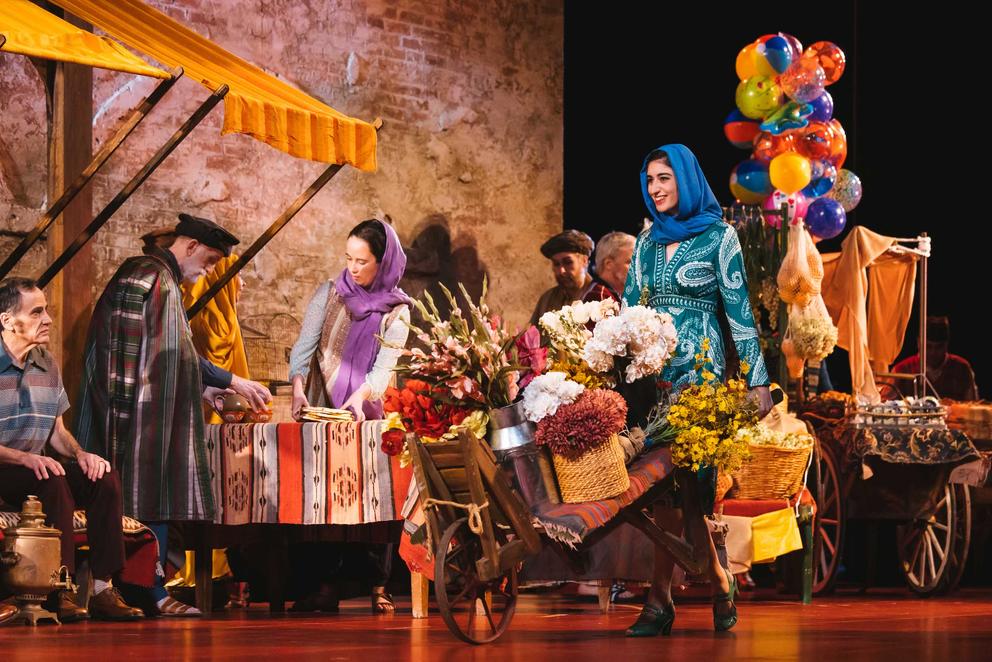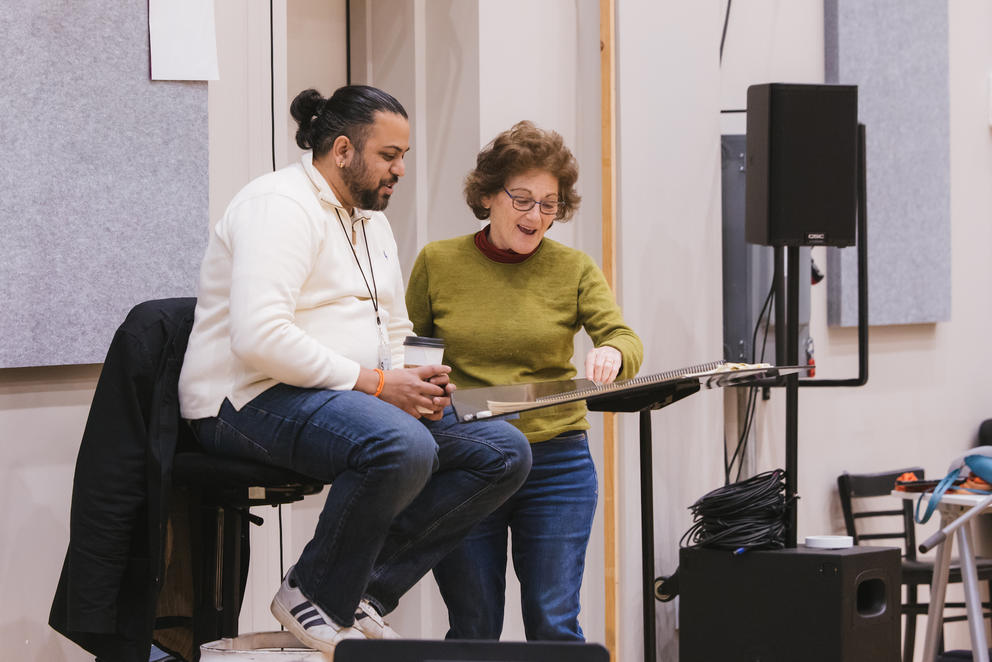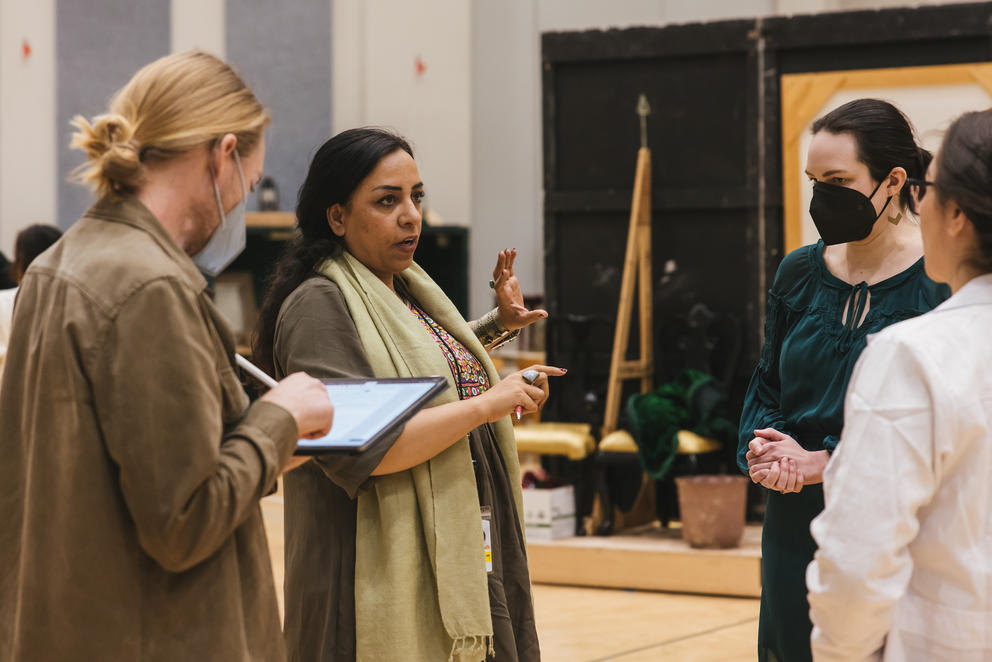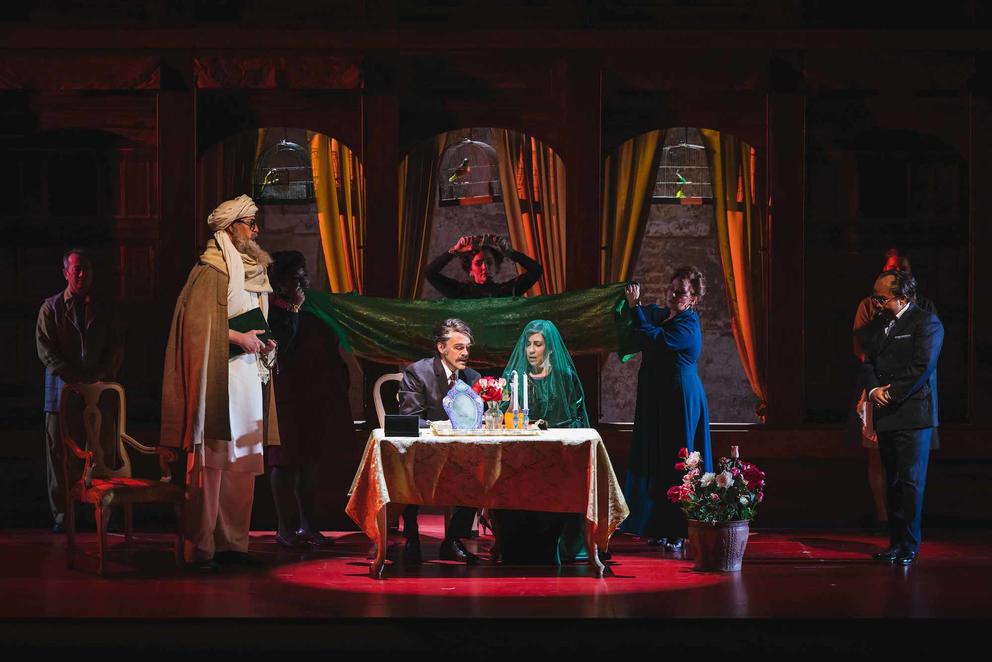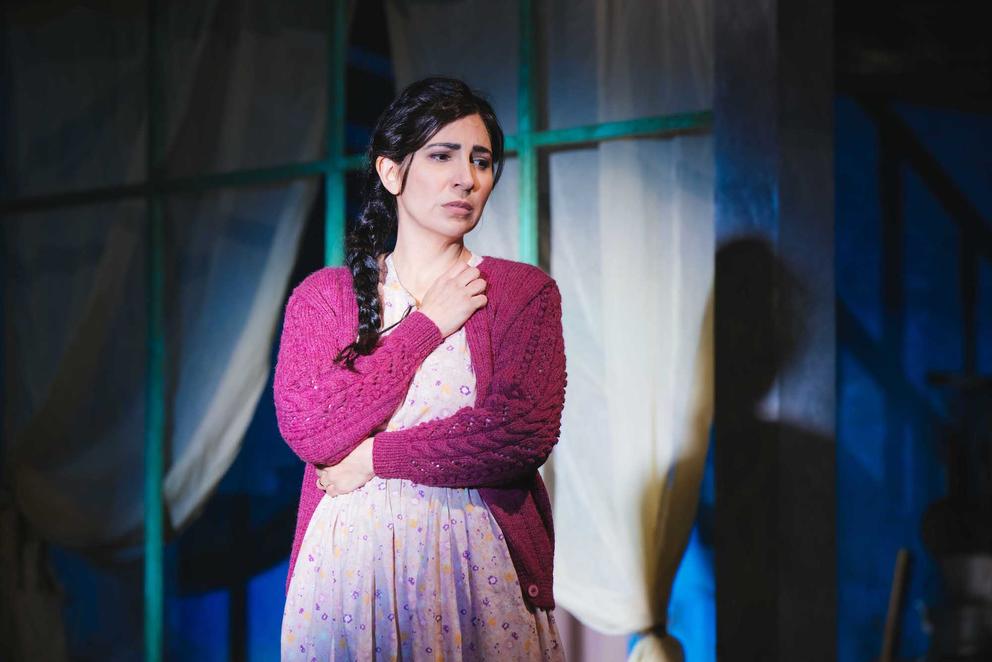If you only know Afghanistan through depictions of its war-ravaged history, the vibrant beauty of these stage images at Seattle Opera may seem like a surprising way to evoke this troubled country.
But such imagery is familiar to Roya Sadat, the Afghan filmmaker who is directing the world premiere opera A Thousand Splendid Suns (through March 11).
By the end of this deeply engrossing saga of a life-changing friendship, you’ll have a new impression of Afghanistan imprinted in your mind — thanks to fleeting scenes of a prosperous Kabul shopping district filled with women in colorful modern dress, of children playing happily — along with a lingering sense of the power of love and female courage.
A daring and well-known filmmaker in her home country, Sadat was an inspired choice by Seattle Opera general manager Christina Scheppelmann. Though she has earned awards for her films and worked in theater before, Sadat had never directed an opera until now.
She worked in collaboration with an impressive team: Seattle-grown veteran composer Sheila Silver created the sweeping, haunting score; opera writer Stephen Kitsakos wrote the swiftly paced libretto (which is in English); scenic designer Misha Kachman created stunning visuals with lighting designer Jen Schriever and Seattle-based costumer Deborah Trout.
But according to Silver, it’s Sadat who “brings this incredible authenticity to the project.” The director is also a passionate activist for women’s rights, Silver notes, “who wants the world to know what’s happening in her country.”
Silver spent more than a decade bringing her composition for the opera to fruition, guided by her own passion for the bestselling novel by Afghan author Khaled Hosseini that it is based on. (The book was also adapted into a non-musical play, performed in 2018 at Seattle Repertory Theatre, and has been optioned for a TV miniseries.) “I didn’t choose this project, this project chose me,” Silver commented.
Influenced in part by her music studies in India, Silver’s score artfully blends familiar Western orchestral and operatic aspects with the sounds of Indigenous Central and South Asian instruments, such as the tabla (drums) and the bansuri (bamboo flute). Through sound and sight, Hosseini’s dramatic tale unfolds over several decades of Afghanistan’s tumultuous history.
Hosseini’s first hit novel, The Kite Runner, portrayed the coming of age of Afghan men. A Thousand Splendid Suns concerns the lives of two women from different backgrounds who become surrogate mother and daughter to each other — after being forcibly married to the same man. Together, they defy the cruelty and oppression of their husband and the Taliban.
This is a story that Sadat knows well, one that resonates with her previous body of work, and with the present circumstances of women in Afghanistan. “Sometimes the story is coming to you,” she noted during an interview days before the production’s premiere. “I don’t choose it. It is like the stories capture you.”
Posing challenges to a society long and harshly dominated by men, she has made more than half a dozen films and numerous television series in her country, works that illuminate the lives of Afghan women — urban and rural women, impoverished women and educated professionals.
Sadat recalled that when she made her first feature, Three Dots (Seh Noktah), some 20 years ago, she was largely self-taught. Studying film was not yet possible at Kabul University, one of Afghanistan’s major education institutions. (She later studied filmmaking in Korea.) Yet with few technical resources and no professional actors in her cast, Sadat shot a vivid, heartbreaking tale about a young Afghan woman who takes desperate measures to feed her children.
Though unpolished, this promising start to Sadat’s career brought her international attention as the first Afghan woman filmmaker of the “post-Taliban” years — meaning after U.S. forces helped oust the fundamentalist Islamic group from power in 2001.
With her filmmaker sister Alka Sadat, she created the Afghan media company Roya Film House, which has produced films, instituted a training program in filmmaking and presented the annual Herat International Women’s Film Festival in Sadat’s birthplace of Herat. Roya Sadat's writer/filmmaker husband, Aziz Deildar, also joined the company.
In 2017 Roya Film House released the acclaimed feature film A Letter to the President, which portrays a female police official in Kabul who endeavors to help a village woman accused of adultery by appealing directly to the country’s leaders. Sadat has recently been working on a new film project, Sima’s Song, a 1970s-set tale of friendship that she has said will go beyond stereotypical stories of Afghan oppression and war.
But during a November 2021 visit to Seattle, on her way to a meeting about A Thousand Splendid Suns, Sadat learned from a text message that after 20 years of American military presence, U.S. forces were abruptly leaving her country. In the chaos that followed, and with little resistance from the Afghan army, the Taliban quickly assumed power again.
A wedding scene from "A Thousand Splendid Suns" at Seattle Opera, with (in foreground) Andrew Potter as Mullah, John Moore as Rasheed, Karin Mushegain as Mariam, and Martin Bakari as Jalil. Background, from left: Ibidunni Ojikutu as Wife #2, Sarah Coit as Wife #3, and Sarah Mattox as Wife #1. (Antone Patterson)
Since then, Sadat and husband Deildar have not risked returning to their homeland with their two children, for fear of the family’s safety. The Taliban, she noted, is well aware of her films and her advocacy on behalf of women. With her family temporarily based in Virginia, Sadat is unsure when she will be able to go back to her country.
“I had never [chosen] to leave Afghanistan,” she explained. “We have a company; we have family there. It was our home. During the peace negotiations with the Taliban [before they regained power], we knew they talked about the rights of women, and we had hope it would be better than before with [them].”
But the new ruling force quickly implemented policies to deny women the right to be fully educated, to work, to participate in politics. “They changed all the systems,” said Sadat. “They want women to just stay inside, in the home. It’s like Sharia Islamic law, but the Taliban have their own interpretation which is worse. It is very alarming.”
“Now the women protest in the street,” she continued, “and the Taliban puts them in jail, and tortures them. But the women are not silent, they come together in houses to use social media. They are the only ones protesting.”
Women’s resilience, strength and tenacity are central to the new opera as well.
Though it takes place from the 1960s into the 1990s, A Thousand Splendid Suns (whose title quotes a 17th-century poem extolling the beauty of Kabul) movingly portrays many of the same themes Sadat has explored in her films, and echoes issues facing women in Afghanistan under the new regime.
The story’s older woman character, Mariam (movingly played by Karin Mushegain), was raised in a village near Herat and suffers from being born out of wedlock and married off to a callous, much older man, Rasheed (John Moore).
The younger wife, Laila (the luminous Maureen McKay), grew up down the street in a more contemporary, middle-class Kabul family, which shatters when her brothers die in war and her parents are killed in a Kabul bombing raid. Laila, injured and pregnant by a boy presumed dead, is also forced to marry Rasheed.
Though the opera ends with a grievous act, Sadat and Silver do not view it as simply a tragedy, but also a saga of love and meaningful sacrifice. “The story in many ways shows [the] women they don’t talk about in the media. These are strong women, who never give up,” Sadat said.
She contends that the ending is not sad. “You get a hope, a sign, a connection, about how these women find and use their own power.”
“The strength and love and commitment between these two women is profoundly powerful,” asserted Silver, “because they develop a bond that sustains them both.”
With her deep experience in crafting visual images, Sadat originally thought the Seattle production “could have a modern abstraction look, not realistic, to tell this story, for it to be more magical and surreal,” she explained.
But after the Taliban regained power, she had a change of heart. “I felt it’s really important right now to go for more reality. In the pre-Taliban street scenes, you can see the modern clothing, the people happy, and then during the civil war, life slowly loses its color.”
In collaboration with Sadat, set designer Kachman wanted to create both an emotional and physical landscape for the opera. “For the American theatergoer, when the word Afghanistan is said it conjures certain images of a particular place — maybe of war, misery, devastation,” Kachman said. “But it’s also a place of incredible history and stunning beauty. That was our starting point.”
The turmoil and turbulence in Afghanistan’s history are certainly evident in A Thousand Splendid Suns, as they were in the novel that inspired it. But so is the beauty of this place — and the people.
“The story is not talking only about violence,” stressed Silver. “This is about people who try to stand for themselves, to be themselves, even in violent times.”
Get the latest in local arts and culture
This weekly newsletter brings arts news and cultural events straight to your inbox.

